The Gift of South Dakota
Subscriptions to South Dakota Magazine make great gifts!
Subscribe today — 1 year (6 issues) is just $29!
The Joys of Farm Toys
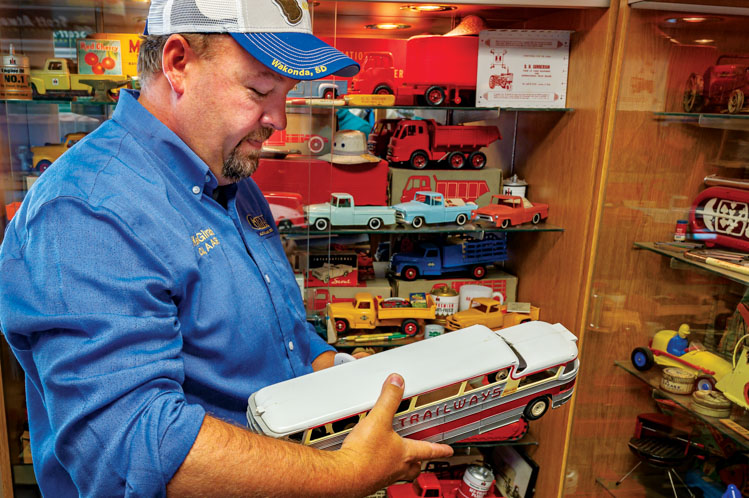 |
| Ken Girard (above) and his brother, Mike, understand the human impulse to collect. Their office walls and warehouses are adorned with their own treasures. |
Travis Hughes roused two of his sons early on a Saturday last spring, but instead of working on their Andover farm, as they might normally do, they drove south four hours to the little town of Wakonda for a toy tractor auction.
More than 100 farm toy aficionados were already in the Wakonda Legion Hall when the Hugheses arrived at mid-morning. The Legion ladies were serving coffee and homemade sweets from behind a long counter as the auction-goers — most of them wearing blue jeans and farm caps — admired and inspected hundreds of toys on several rows of tables. Some were in their original boxes. Sometimes there was only a box for sale.
Travis, 43, was among the youngest to register as a buyer that morning; his boys Scott, 14, and Orin, 11, were the only school-age youth in the metal folding chairs of the Legion Hall.
Rural South Dakotans are familiar with auctions and markets, but Wakonda’s toy tractor sales are quite unlike farm country’s somber sales of grain and livestock. Frowns are rare and nobody loses.
“Like one buyer told me, ‘It’s toys!’” laughs Ken Girard who, along with his brother Mike and a small team, has turned antique farm toys into the biggest attraction in Wakonda. The family business operates from 11 buildings within the city limits, including several large warehouses where a Clay County farmer may walk in the door with a single toy tractor while the Girards and their crew are unloading a semi-trailer load from Canada.
Walls in several of the buildings are adorned with the Girards’ personal collections. Ken’s office is a maze of marine memorabilia and plastic toys from the 1950s. Mike likes vintage root beer advertising signs. Parked throughout are antique tractors and trucks, outboard motors, hunting paraphernalia and other artifacts of America’s great outdoors.
Wakonda, a town of 300, lies northwest of Vermillion in Clay County. Its name comes from a Santee Sioux word that means wonderful. Wakonda’s most recent claim to fame is the 101-game winning streak by the high school girls basketball team from 1987 to 1991. The school has since merged with nearby Irene. The only restaurant in town, modestly called The Pit, operates from the basement of an old hotel. The big Legion Hall is the social center, home to everything from wedding receptions to fundraisers and funeral dinners.
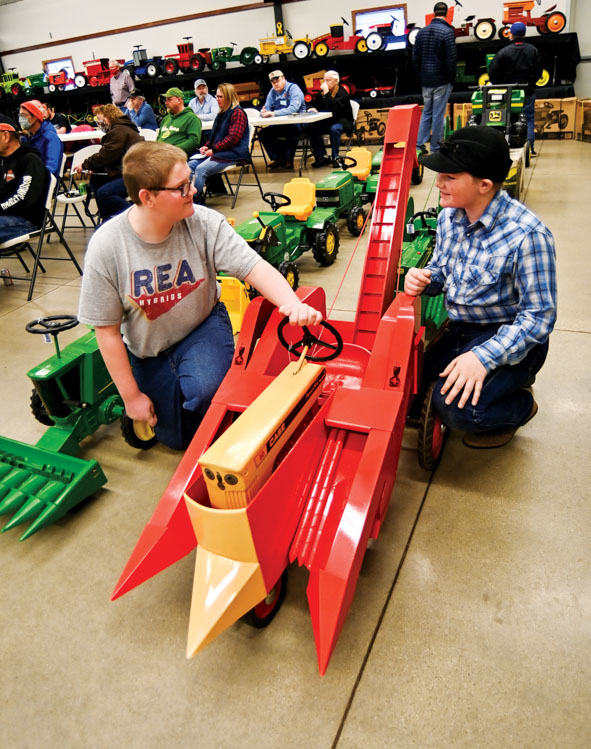 |
| Wakonda's auctions attract collectors and spectators from throughout farm country, including brothers Scott and Orin Hughes of Andover. |
Ken and Mike’s parents, Marvin and Pat, started the family auction business at Wakonda in 1970. For years, they kept busy with farm and household auctions, and the sons spent weekends lining up furniture and appliances on the lawns.
“Back then, I had no desire to be in the auction business,” admits Ken. “But I spent one year in college and I didn’t like that, so the next summer, in 1998, I started auctioneer school.”
Just as he and Mike joined the business as adults, farm auctions began to dwindle. “Once there was a family making a living on 80 acres or every quarter section,” Ken says, “but they are all gone. We had to find some other specialties.”
The Girards began to focus on real estate auctions, and they also investigated the Internet. “I took a class in online auctions from Kurt Aumann of Illinois,” says Ken. “Kurt also specialized in toy sales so I figured if he can do it, so can we.”
In 2001, the Girards invited consignments from friends and neighbors in southeast South Dakota. Local families brought a few tractors and trucks, and Harrisburg toy dealer Cam Lind brought a few hundred items. “I don’t remember the prices that day,” says Ken. “All I remember is that we had a lot of really happy sellers and a lot of smiling buyers. I thought, heck we are in farming country so maybe this can work.”
The Girard brothers have also gained a reputation for firearm auctions, but they can only schedule a few every year. “Guns take a lot of space and they require a lot of paperwork,” says Mike. “The ATF keeps track from the time we log in a consignment until the buyer takes it home.” Federal agents seem far less interested in toy tractors and the people who collect them.
The brothers hold toy tractor auctions nearly every Saturday at the Legion Hall. Sometimes, the sale spills over into Sunday. Many of their consignments are shipped from hundreds of miles away, sometimes by the truckful. When the bidding stops, the auction crew spends the next few days shipping hundreds of toys to buyers from all 50 states and foreign countries. Through the years, Wakonda has become the national hub of farm toy trading.
Marvin Girard died two years ago, but his wife Pat still helps to clerk the sales. Scott Moore, a Centerville auctioneer, takes a turn at the microphone along with Mike and Ken and they all perform as ring men, meaning they roam the auction floor, looking for bids and encouraging the buyers.
The live auction is a show, and most of the people in the seats are there to watch. “We get that,” says Ken. “You don’t have to buy anything and we don’t charge anything to attend.”
While online bidders are a major reason for the Girards’ success, in-person attendees like the Hugheses are still a big part of every sale. Travis Hughes and his boys farm with “green equipment,” meaning John Deere. They have a few antique Deere tractors in a farm shed, and they collect the company’s old toys, especially the early grain combines.
When the bids for toy tractors began to exceed $1,000 at the Wakonda auction, Scott Hughes leaned over to his dad and said, “We could buy the real equipment cheaper than we can buy the toys!”
Scott is correct, says Ken Girard. “That was hard to wrap your head around when it first started happening, but now I completely understand.” The toy is easier to maintain and store than a full-size tractor. Also, perhaps there’s more nostalgia for the toy than an exhaust-spouting, back-breaking, hard-to-start two-ton pile of bolts and metal.
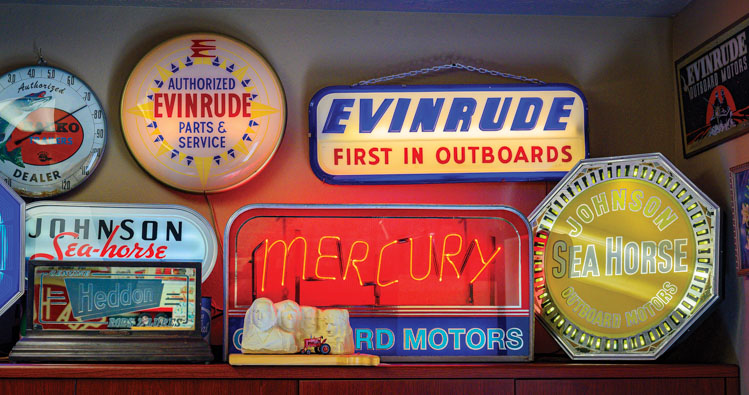 |
| The Girards' own collections range from tractors to boat memorabilia. |
Even stranger, the cardboard box that came with the toy from the factory can be worth more than the toy and the real tractor. “We’ve seen that the box can often double the value,” says Girard. “We’ve sold a toy tractor for a few hundred dollars and then turned around and sold a mint of the same toy in its original box for thousands of dollars.”
Ken says farm toys are like a lot of things in life, from bitcoins to pork bellies and baseball cards; it’s hard to decide what’s a fair value or a good investment.
Consequently, the young auctioneer — who now knows the values of farm toys as well as anyone in America — has simple advice for buyers who join him in the Wakonda Legion Hall or online: “Buy it if you like it. Don’t do it to invest. You have to be pretty savvy to invest in toys. Just buy what you like. Don’t buy if you’re worried about what it might sell for later.” He believes few of his bidders bank on the notion that their purchases will be good financial investments.
Still, the toys keep gaining value. The national record for a toy tractor is $74,000 for a rare “Coffin Block” John Deere Model A pedal tractor. “We haven’t had a chance to sell one of those — yet,” says Ken. The Girards’ highest bid was $9,000 for a gold-plated Farmall 560 1/8th scale.
“There’s been an ongoing argument among toy dealers that there’ll soon be no young guys in the hobby and then the stuff won’t be worth much of anything,” says Ken. “But the fact is there’s never been any young people in the hobby. Almost nobody collects until they have space in their home, maybe because the children have grown and gone, and that’s also when they have some disposable income.”
Bidders are generally males who were raised on a farm, or at least have good memories of summers on a relative’s farm. They begin by collecting the tractor their dad drove. “Then they want the tractor an uncle had. Then they say, ‘My neighbor had one of those so we should maybe have one of them.’ Before you know it, you want them all!”
Ken believes toy tractor enthusiasts are different from risk-takers who invest in cryptocurrencies, and even a breed apart from collectors who focus on comic books, sports memorabilia and rare coins.
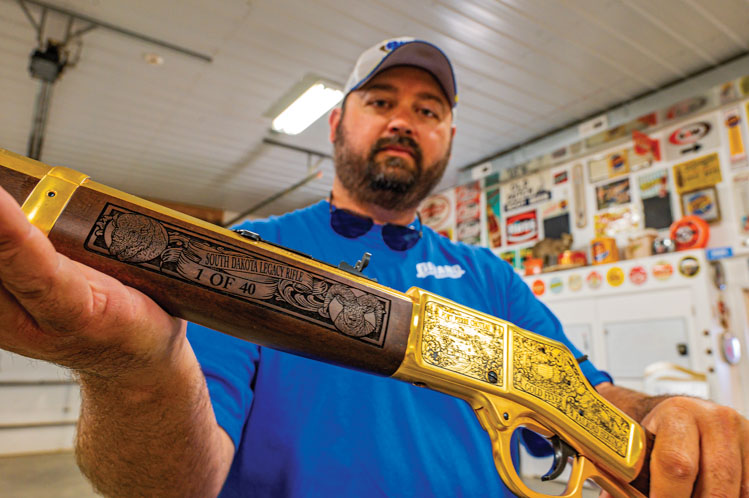 |
| The Wakonda auctioneers also organize several gun sales every year. Mike Girard (above) says the government is much more interested in firearms than farm toys. |
Many of the Girards’ customers, both online and those who show up in person, come from states east of South Dakota. “Iowa, Indiana, Ohio, Pennsylvania — that’s probably where the biggest portion come from,” Ken says. “But we’ve shipped tractors to Hawaii and Alaska.” Interest in farm toys seems to lessen in ranching country, which begins west of Wakonda, but Ken surmises that it’s only because there are fewer people living there.
Just as farmers enjoy the long-standing “color wars” of tractor companies, toy collectors also play favorites. John Deere has the most fans, partly because the company makes more tractors — real and toy — than their competitors. Deere’s famous red rival Farmall (which morphed into IH and today’s Case IH) also has many fans and there are buyers for every make and color, including lesser-known companies like Cockshutt, Oliver, Massey-Harris and Allis-Chalmers.
The Girards enjoy the nostalgia-fueled camaraderie and good-natured rivalry of toy collectors. “They’ll drive here together, sit together and then bid against each other,” Ken says. Some are such regular attendees that they have a favorite chair in the Legion Hall. “It’s just like church,” he laughs. “They always show up and sit in the same place, and if they miss a day then their friends want to know if they’re okay.”
Seeing an empty chair is the hardest part of the profession, Ken says. “We’ve come to develop quite a relationship with many of these guys. Some I see a lot more than I see my own relatives. But let’s face it, some are on the senior side of life and suddenly they are gone — gone to a nursing home or they leave this Earth. Then maybe you have to sell the toys you sold them over the last 15 years. While we’re proud to do it, it’s hard sometimes.”
Editor’s Note: This story is revised from the September/October 2021 issue of South Dakota Magazine. To order a copy or to subscribe, call (800) 456-5117.




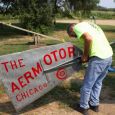





Comments